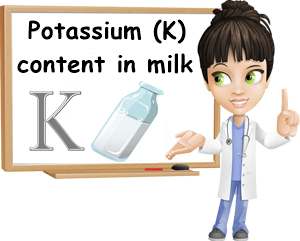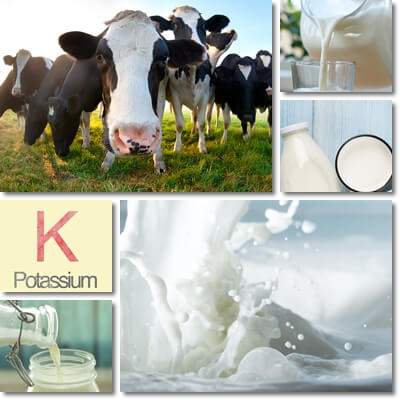Milk is one of the best dietary sources of potassium, the dietary nutrient and electrolyte with the biggest health benefits for cardiovascular health. On average, 100 ml of milk or less than half a cup provides between 9 and 11% of the recommended daily intake of potassium for an average adult. Which is actually quite a good amount. And yet, milk is often left out of most lists of foods high in potassium, despite being both a good source of it and a food most people have access to easily in terms of availability and cost.

How much potassium in cow milk?
- Whole cow milk with a fat content between 3.25% fat and 3.7% fat has 132 to 150-151 mg of potassium per 100 ml and 322 to 366-368 mg of potassium per cup (244 g).
- Low-fat 2% milk has 162 mg of potassium per 100 ml and 395 mg per cup.
- Low-fat 1% milk has up to 182 mg of potassium per 100 ml and 446 mg per cup.
- Non-fat milk or skim milk has 166-182 mg of potassium per 100 ml and 410 to 444 mg per cup.
How much potassium in sheep milk?
Sheep milk has about the same potassium content as cow’s milk. For example, whole sheep milk has 137 mg of potassium per 100 ml, 334.28 mg per cup (244 g) or 336 mg per cup (245 g). Whole sheep’s milk has 6-7 g of fat per 100 ml of milk. Technically, low-fat options would mean a higher potassium content.
How much potassium in goat milk?
Goat milk tends to have even more of the blood pressure-regulating electrolyte than cow and sheep milk. 100 ml of regular goat milk (3.5% fat) has 204 mg of potassium, while 1 cup of goat milk (244 g) has 497.76 mg of potassium. The general rule is – the lower the fat content, the higher the potassium content. As such, goat milk options with reduced fat are supposed to have an even higher content of the essential nutrient.

How much potassium in water buffalo milk?
Indian water buffalo milk has 178 mg of potassium per 100 ml and 434.32 mg per cup (244 g). In general, potassium content is higher in the reduced-fat and non-fat/skim milk versions compared to whole milk. Unless the milk is diluted, a common practice with water buffalo milk as a result of its impressive fat content – 8 g of fat per 100 ml of milk. Technically, for the potassium content to increase, the weight of the fat that is removed must be replaced by the undiluted liquid portion of the milk, where the potassium is contained.
How much potassium in camel milk?
100 ml of camel milk has an estimated 193 mg of potassium, which means a 244 g cup of the milk has 470.92 mg of potassium. This a rather impressive amount and, should you have access to the milk and find it acceptable, then know it’s beneficial for nervous system and cardiovascular health in general and blood pressure in particular. Camel milk is also higher in vitamin C and lower in fat (with an average of 1.9 g of fat per 100 ml of milk).
Daily potassium requirements
How much potassium do you need per day according to age?
- Babies (0 months – 6 months): 400 mg a day, from maternal milk.
- Babies (6 -12 months): 700 mg, from maternal milk and/or food sources.
- Children (1 year – 13 years): starting at 3000 mg a day and working up to 4500 mg a day.
1-3 years: 3000 mg
4-8 years: 3800 mg
9-13 years: up to 4500 mg - Men (14 and older): 4700 mg.
- Women (14 and older): 4700 mg.
- Pregnant women: 4700 mg.
- Nursing mothers: 5100 mg.
- Seniors (65 and older): 4700 mg.
Dietary recommendations set for US and Canada. Factors such as diet, level of physical activity, existing medical conditions and other may influence dietary requirements.
Why is it so important to get enough potassium in our diets every single day?
Some of the biggest benefits of potassium as an essential dietary nutrient include:
Potassium is good for high blood pressure
What makes potassium good for high blood pressure? The essential nutrient relieves pressure in blood vessels which contributes to better blood pressure numbers. Meeting daily requirements can successfully prevent and reverse high blood pressure (hypertension). Potassium works best in combination with magnesium which contributes with additional blood pressure lowering effects. Dietary supplements containing potassium and magnesium can lower high blood pressure within minutes, as well as reduce high heart rate and combat arrhythmia.
Potassium maintains the electrolyte balance in the body
Potassium has many functions in the human body, one of them being balancing levels of sodium, magnesium and other electrolytes in blood plasma. Electrolytes carry electrical impulses from the brain to the body and coordinate nervous system activity. Potassium has direct and meaningful effects on every single muscle in the body, including the heart. One major benefit of its electrolyte-balancing properties is maintaining normal heart rhythm.
Potassium combats water retention
Sodium causes water retention, that is, it makes the body retain water. But because potassium regulates sodium levels in the bloodstream, counteracting its water retaining effects, it helps combat water retention and its side effects which include face puffiness, swollen legs, swollen feet, swollen ankles, swollen arms, swollen hands and abdomen.
Potassium helps food travel through the intestines
How does potassium aid digestion along? The intestinal wall is essentially muscle and potassium coordinates muscle activity through its electrolytic properties. More exactly, potassium helps electrical impulses travel from the brain and nervous system to muscles in the body, including muscles in the GI tract, regulating their activity. As a result, getting enough potassium every day helps your intestinal muscles retain their ability to effectively move food along the digestive tract.
Potassium is good for bones and teeth
Calcium is released from bones to counteract acidity in the body, specifically acidity in the blood. However, this regulatory emergency mechanism depletes bones, and teeth, of calcium, weakening them. By regulating specific acids in the body and actively counteracting high pH levels, potassium helps keep calcium in bones with benefits for bone density and bone strength.
Potassium benefits for blood sugar and diabetes
Meeting your daily potassium requirements helps prevent drops in blood sugar which is a good thing for both diabetics and non-diabetics alike. Blood sugar levels that are too low cause overeating as well as side effects such as headaches, dizziness and fainting, nausea, vomiting, tachycardia (or high heart rate), palpitations, cold sweats, anxiety and panic attacks as well as increase risks of falls and injuries.
Potassium is also offered as treatment in diabetic ketoacidosis, a state of emergency in the diabetic patient. Diabetic ketoacidosis is brought on by very low insulin levels or poor insulin action which typically causes high blood sugar and depletes potassium and other electrolytes in the blood. Low potassium levels in the blood puts one at risk for fatal arrhythmias, heart attacks and other cardiovascular events.
Potassium for muscle cramps, muscle aches and pains
Getting enough potassium in your diet supports normal muscle function and prevents muscle weakness, muscle cramps and muscle aches and pains, including cramps and soreness after exercise. This is because potassium helps muscle contract and relax via its electrolyte properties.
Potassium helps you have quick reflexes
Getting enough potassium in your diet helps keep your reflexes quick. This is a result of its direct action on the nervous system. Potassium regulates the transmission of electrical impulses from the nervous system to every muscle in the body, fine tuning muscle function.
Potassium benefits for stress and anxiety
Did you know that potassium reduces stress and anxiety? The benefits of potassium for stress and anxiety are a direct result of its role in regulating nervous system activity.
Potassium is good for cardiovascular health
Getting enough potassium in your diet every day contributes to lower risks of cardiovascular disease, including lower risks of high blood pressure or hypertension, arrhythmias such as palpitations or extrasystoles, myocardial infarction or heart attack etc. For optimal cardiovascular health, you also need to meet your daily requirements of magnesium, found in plentiful amounts in dairy milk, nuts and seeds, and vitamin B6 found in both animal and plant foods, including bananas.
Conclusion
Of all the foods that are good sources of potassium, milk is definitely one to consider. It’s relatively cheap and you can find it just about everywhere. Just remember that the lower the fat content, the higher the potassium and the better it is for your health. And the next time you’re pondering which to choose – whole milk, 1%, 2% or skim/non-fat? – know that reduced fat options have some pretty wonderful benefits, especially for cardiovascular and nervous system health.
